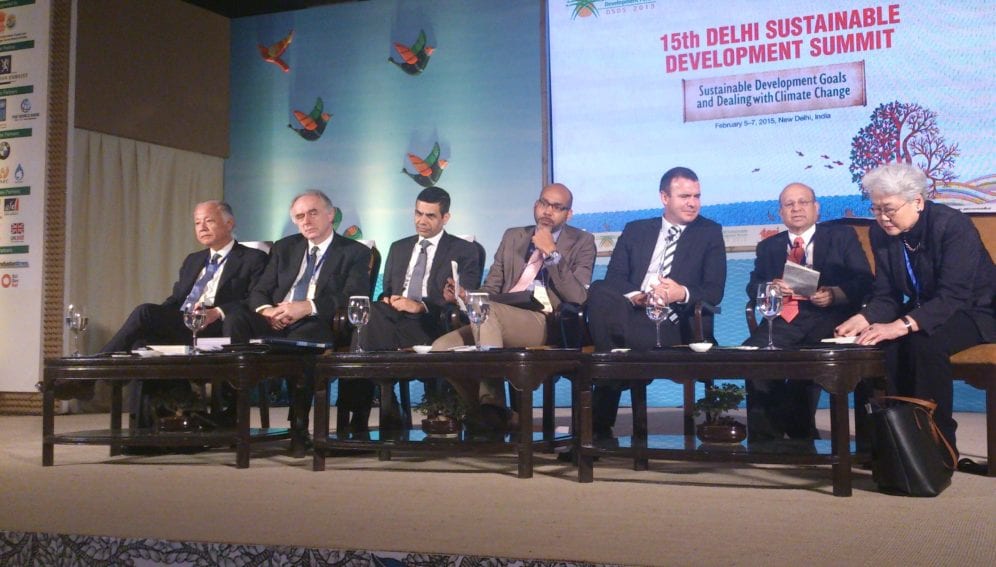Send to a friend
The details you provide on this page will not be used to send unsolicited email, and will not be sold to a 3rd party. See privacy policy.
A New Delhi discussion on the IPCC’s future focused on synergies in research and inclusivity, writes Nick Perkins.
The Delhi Sustainable Development Summit, now in its 16th year, is a formidable affair — an inspired combination of activism, research, seminar and symbolic communication.
Plastic-free and vegetarian, this year’s edition (5—7 February) managed to attract Arnold Schwarzenegger to its opening ceremony and CNN celebrities to emcee the events. An impressive array of Nobel laureates and heads of state attended the sessions. Occasionally, the earnestness seemed a little eccentric like the multi-faith panel at its closing, but you can't fault The Energy and Resources Institute (TERI), the organisers, for effort. It's all done in-house.
For me though the Summit's enduring value was best captured by a parallel session I attended on future reports from the Intergovernmental Panel on Climate Change (IPCC) that functions under UN auspices. It was relevant, connected and pulled no punches.
The session featured three former IPCC report authors, climate negotiators and some from the Climate and Development Knowledge Network (CDKN), which is primarily tasked with sharing knowledge from these reports with policy audiences. On the face of it, we had a credible group to assess the future of the IPCC but, as Yvo de Boer of the Global Green Growth Institute (GGGI) pointed out, this gathering of insiders does not bode well for radical reform. Nonetheless, there were some reasonably radical ideas on offer.
Climate change is the only multilateral negotiating process underpinned by a scientific partner. A partner, which has secured moral authority and academic respect, equally, so there might not be much appetite for big changes. However it is this success that presents the overwhelming concern.
More than once at the summit, it was noted that science had won and the challenges of climate change now lie elsewhere.
It was this concern about enduring relevance which underpinned many of the ideas floated during the session.
Communication
IPCC chair and director general of TERI, Rajendra Pachauri, indicated the 5th assessment report has data and analysis, which is important for mitigation and adaptation strategies, suggesting that questions of the IPCC's relevance were misplaced. What his rebuttal proved most effectively is that the IPCC has a fundamental challenge around its brand; it is the panel that proved climate change is happening. The suggestions in the session for a more digitally aware communication campaign or the ambivalence about a more prescriptive report all fall out of the need to prove the versatility of the brand.
Regionalisation
There’s agreement that the report needs to be more geographically granular. A planner from India’s Ministry of the Environment and Forests made an impassioned plea for authors to develop reports which his constituencies could make meaning of. Clearly, regionally differentiated impacts have not resonated and need to be presented differently and more clearly. As Arvid Hallen from the Research Council of Norway pointed out, this would include getting better at engaging the social sciences to provide assessment of feasibility in various social contexts. This has some methodological implications, but we'll come to that.
Research updates
It was noted that in many ways the timing of the assessment reports was awkward for all concerned. Often too quick to demonstrate the kind of substantive incremental shifts so crucial to building scientific knowledge, but not sufficiently timely for policy schedules. The suggestion was that a parallel reporting process would capture breakthroughs as and when they occur. A former report author, Eswaran Somanathan, thought these updates would allow a shorter review process. For instance, embedding the breakthroughs in maritime science on warming levels in the scheduled release of the assessment report was seen as unnecessary. Of course the panel will never have the flexibility of your average research consortium but clearly there is a lot of space for innovation between the papers of such projects and the IPCC reports produced now.
Content focus
Actually there were two framing ideas here. The first was for more focus on monitoring, including financing. Related to this was a suggestion that the methodological focus should shift from modelling to physical observation. This would have the additional benefit of perceptibly extending the report's deployment of evidence — even if it takes the panel into a new kind of political awkwardness.
The second significant thematic renewal was around integration, not only for more synergy internally between working groups for instance, but also across the science community at the interface with development studies. It was clear for instance, Peter Holmgren who heads the Centre for International Forestry Research had a mission to press for a closer working relationship between the CGIAR and the IPCC. The efforts at integration might be made easier by the update reports suggested above.
Inclusivity
This is perhaps the most confounding challenge for the panel. Many of the authors present, notably the women, said the IPCC needs to do more about including work by developing world researchers. The exclusion is a natural consequence of relying on the existing research establishment. After all, less than one per cent of authors in premier league journals are based in the developing world and this in turn reflects the broader structural inequities.
Still, while this is all understandable, not addressing it will be a missed opportunity for the IPCC. Purnamita Dasgupta, another report author, had some suggestions on how the panel might be restructured with more plurality to address this challenge.
Academia is a conservative enterprise, radical reform is regarded with suspicion but climate change requires profound societal changes, even climate science might expect to be affected by the evangelical fervour of its strongest proponents.
Nick Perkins is the director of SciDev.Net. @Nick_Ishmael














